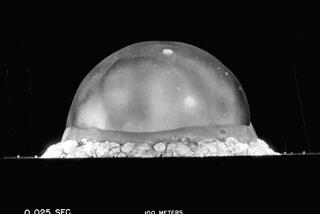We Just Couldn’t Wait to Celebrate
- Share via
To those of you who figured out that Jan. 1, 2000, is not the start of the third millennium, congratulations. You’re right, so your frustration in trying to prove it to others, including this newspaper, is understandable.
Actually, Times editors know the new millennium under our calendar, the most widely used in the world, won’t begin until Jan. 1, 2001. Why then are there daily references in the newspaper to the new millennium dawning in two weeks? Why are Times journalists, with rare exception, perpetuating a misconception instead of setting the record straight, as one might expect of a newspaper? As one reader put it, “[You] reasonably educated people . . . are misinforming readers intentionally. Why?” Because, says Editor Michael Parks, “We accept the popular conception of the new millennium, which is more a metaphor for a new era than a calendar event.” The Times has reported the millennium debate and noted that millions of people--Hindu, Muslim, Bahai, Chinese and Jews, among others--have their own calendars (about 40 are in use). For these people, who use the Western calendar for business or secular purposes, the “millennium” is almost a non-event.
For the record:
12:00 a.m. Dec. 22, 1999 For the Record
Los Angeles Times Wednesday December 22, 1999 Home Edition Metro Part B Page 9 Opinion Desk 1 inches; 17 words Type of Material: Correction
Readers’ representative--Cardinal Roger Mahony’s name was misspelled in a column by Narda Zacchino that ran on Sunday.
But The Times, like seemingly every institution in America, has been swept up in the celebration of this occasion rather than acknowledging the technically accurate facts. And many readers are slamming us for it.
“I have news for you and all the other ignoramuses who think this is the last year of this millennium--next year is the last year. . . . Are you that ignorant or do you just not care?” was a typical comment. “Morons,” one reader called us. Another was kinder: “How could such brilliant people be caught up in such inaccuracy?” Another simply said, “This is fourth-grade math.”
It is, sort of. The modern Western, or Gregorian, calendar, launched under Pope Gregory XIII in 1582, is a revision of the Julian calendar, which was drafted under Julius Caesar before the birth of Jesus. In the 6th century, the Catholic Church, which controlled a lot then, had already assigned the Julian calendar a new start date to coincide with the year Jesus was born. Although theologians did not know his precise birth date, and with no zero in Roman numerals, they dubbed the birth year AD 1. (AD is for the Latin Anno Domini--Year of the Lord--which has been widely supplanted by the more secular CE, for Common Era, just as BC--Before Christ--has become BCE, or Before the Common Era.) Jan. 1 remained the first day of that year.
Thus, the first decade ended after the 10th year was completed. In Western culture, you celebrate your 30th birthday after you’ve completed your 30th year of life and are entering the first day of your 31st year. So, under this logic, the third millennium begins after the first 2,000 years are completed--Dec. 31, 2000. Indeed, people celebrated the first day of the 20th century on Jan. 1, 1901.
How did we lose track of time? First, the frenzy over Y2K preparations fed the millennial madness, leading people to confuse the Year 2000 with the start of the new millennium. Several readers also suggested a 1990s motive: commercialism. “Marketing has been designed to get us to spend our money for special millennium trips, merchandise and everything else under the sun . . . next year they will start the marketing all over again,” one said, echoing others. Like many, even The Times is cashing in with its 100-day “Stories That Shaped the Century” feature--historical front pages, reader contest and full-page ads. It was this feature’s promotional ad referring to the “countdown to the new millennium” that spurred dozens of complaints; “countdown to the Year 2000” would have been preferable.
While many complain, others don’t care about the debate; they want to celebrate. That’s the view of the Catholic Church. Cardinal Roger Mahoney, while agreeing that the millennium begins in 2001, said, “Pope John Paul II has declared 2000 as the great Jubilee Year--and the beginning of the new millennium in the broader sense of Christian history, not the more precise calendar sense.”
In the end, since the date of Jesus’ birth wasn’t precise, and since this isn’t the “correct” calendar for much of the world’s people, does it matter when we mark the millennium? Many readers say yes.
One incensed man enclosed an Oct. 10, 1994, column from The Times by the late Jack Smith, who noted that centuries don’t end in “00” and that “the turn of the millennium” was not six years away, as a Times story at the time claimed. Jack predicted he would not be here for the celebration, but pleaded, “I just hope that, in my memory, The Times will have a little front-page box on Jan. 1, 2000, saying: ‘No, folks, as Jack Smith kept telling us (God rest his soul), today is not the first day of the 21st century. It won’t be for a year yet.”
You’re right, Jack. God rest your soul.


